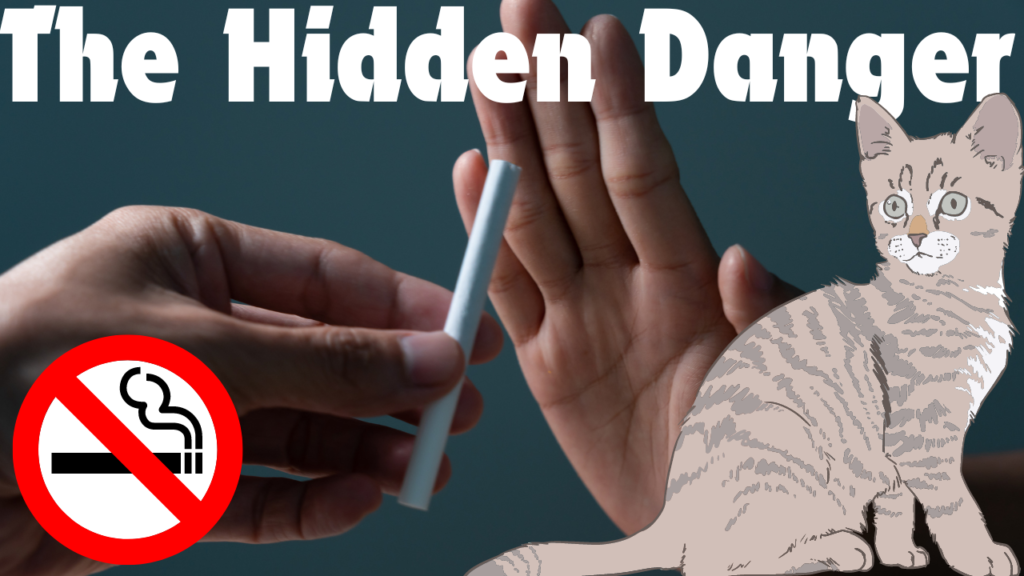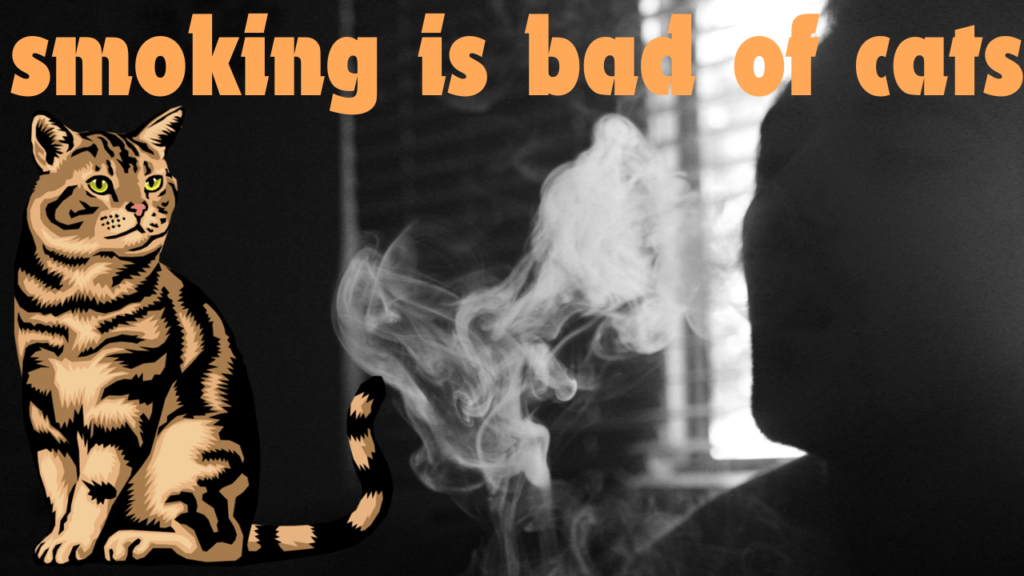Pets are beloved members of our families, but their well-being can often be unintentionally compromised by our habits. One such habit is smoking inside the house, especially around cats. Cats, being smaller and more sensitive than humans, can suffer severe health consequences from exposure to smoke. In this article, we’ll explore the risks associated with smoking indoors when living with a cat, and why it’s important to protect your feline friend from secondhand smoke.
The Effects of Secondhand Smoke on Cats
Just as secondhand smoke poses significant health risks to humans, it can be even more harmful to pets. Secondhand smoke contains thousands of chemicals, many of which are known toxins and carcinogens. When you smoke inside, your cat is exposed to these harmful substances through their respiratory system, and they can also ingest them by grooming themselves after coming into contact with smoke particles that settle on their fur.
Respiratory Problems in Cats
One of the most immediate and serious consequences of smoking in the house with a cat is the risk of respiratory problems. Cats have much smaller lungs and airways than humans, making them more susceptible to respiratory issues. Over time, exposure to smoke can lead to chronic conditions such as asthma, bronchitis, and chronic obstructive pulmonary disease (COPD).
Some signs that your cat may be suffering from smoke-related respiratory issues include:
- Frequent coughing
- Wheezing or difficulty breathing
- Lethargy and fatigue
- Labored breathing after minimal activity
If left untreated, these conditions can worsen, potentially leading to more severe health issues that could be life-threatening.
Increased Risk of Cancer
Cats exposed to secondhand smoke face an increased risk of developing cancer. The toxic chemicals present in cigarette smoke can cause damage to cells over time, leading to the development of tumors. Lung cancer is one of the most common cancers linked to smoking, and cats who live in environments where they are regularly exposed to smoke have a much higher likelihood of developing this disease.
In addition to lung cancer, cats can develop lymphoma, a type of cancer that affects the lymphatic system. Studies have shown that cats living in smoking households are more than twice as likely to develop lymphoma as cats in smoke-free homes.
Nicotine Poisoning in Cats
Another danger that smoking poses to your cat is the risk of nicotine poisoning. Cats are known for their meticulous grooming habits, and they often lick their fur to clean themselves. When you smoke inside the house, nicotine from the smoke can settle on your cat’s fur, and when they groom, they ingest this harmful substance.
Potential symptoms of nicotine poisoning in cats may include:
- Vomiting
- Excessive drooling
- Rapid heart rate
- Tremors or seizures
- Collapse or sudden death in extreme cases
Even small amounts of nicotine can be dangerous for a cat, so it’s crucial to minimize their exposure to smoke and cigarette-related items.
Thirdhand Smoke: The Hidden Danger
Beyond secondhand smoke, there is another layer of risk that many people may not be aware of: thirdhand smoke. This refers to the residual toxins that remain on surfaces after a cigarette has been smoked. These toxins cling to walls, furniture, carpets, and clothing, and can be ingested or absorbed by pets over time. Thirdhand smoke doesn’t disappear quickly; it can linger for days, weeks, or even months, depending on how much smoking has occurred in the house.
For cats, who spend a lot of time in close contact with surfaces—whether they’re lounging on the couch, sleeping on the bed, or playing on the floor—this is a significant risk. When cats groom themselves, they can ingest the chemicals from thirdhand smoke that have settled on their fur, leading to long-term exposure to harmful toxins.

The Impact on Your Cat’s Immune System
In addition to the direct risks to the lungs and internal organs, smoking can also weaken your cat’s immune system. When exposed to the toxic substances in cigarette smoke, a cat’s body must work harder to eliminate the chemicals, which can lead to a compromised immune system. Over time, this weakened immunity can make your cat more vulnerable to infections, illnesses, and other diseases.
Behavioral Changes and Stress in Cats
Cats are highly sensitive creatures, and their health is closely linked to their environment. A smoky, polluted home can cause stress and behavioral changes in cats. Cats rely on their sense of smell to navigate their world, and smoke can impair this ability. A smoke-filled environment may lead to:
- Increased anxiety or nervousness
- Avoidance of certain areas in the house
- Changes in eating habits
- Disrupted sleep patterns
Additionally, the smell of cigarette smoke may deter your cat from spending time in areas where they previously felt safe and comfortable.
Creating a Smoke-Free Environment for Your Cat
Now that we’ve covered the risks associated with smoking in the house with a cat, it’s clear that creating a smoke-free environment is the best option for your pet’s health and well-being. Here are some tips to help protect your cat:
Smoke Outside
The most effective way to reduce your cat’s exposure to harmful chemicals is to smoke outside. By stepping outside to smoke, you prevent the toxins from lingering in your home and on your pet’s belongings.
Ventilate the Home
If you’ve been smoking indoors, it’s essential to ventilate your home regularly. Open windows, use fans, and consider investing in an air purifier with a HEPA filter to help remove smoke particles from the air.
Wash Your Hands and Clothing
Before interacting with your cat after smoking, make sure to wash your hands thoroughly and change any clothing that may have come into contact with smoke. This reduces the chances of transferring harmful chemicals to your cat’s fur.
Clean Surfaces Frequently
Since thirdhand smoke clings to surfaces, it’s important to clean your home regularly, especially areas where your cat spends the most time. Wipe down furniture, vacuum carpets, and wash bedding to reduce the buildup of toxins.
Consider Quitting Smoking
Ultimately, the best way to protect your cat from the dangers of smoke is to consider quitting smoking altogether. There are many resources available to help you quit, and your cat’s health will thank you for it.
Conclusion
Smoking in the house with a cat can have devastating effects on their health. From respiratory issues to cancer and nicotine poisoning, the risks are severe and far-reaching. By creating a smoke-free environment, cleaning your home regularly, and taking steps to minimize your cat’s exposure to harmful chemicals, you can help ensure that your feline companion enjoys a long, healthy life.


